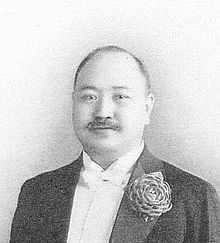- Ding Jianxiu
-
Ding Jianxiu
丁鑑修
Ding JianxiuBorn 1886
Gaizhou Liaoning Province, Empire of ChinaDied 1944
Hsinking, ManchukuoEthnicity Han Chinese Citizenship Manchukuo Occupation Cabinet Minister of the Empire of Manchukuo Ding Jianxiu (simplified Chinese: 丁鉴修; traditional Chinese: 丁鑑修; pinyin: Dīng Jiànxiū, 1886-1944 ), was a politician in the early Republic of China who subsequently served in a number of Cabinet-level ministries of the Empire of Manchukuo.
Biography
A native of Gaizhou Liaoning Province (near Yingkou), Ding was a graduate of the School of Economics of Waseda University in Tokyo, Japan.
On his return to China, he also studied law and human relations. Ding was hired as an instructor at numerous institutions of higher education in Mukden, including the Teacher’s College, Military Academy, Vocational Academy and Police Academy. From 1913, he was a professor at the graduate school of languages at Mukden University. He subsequently served in local government, holding various posts in the Liaoning provincial government and serving also as a director for a Sino-Japanese joint venture company to develop iron ore deposits.
After the death of Fengtian clique warlord, Zhang Zuolin, Ding worked with Yuan Shikai towards the independence of Manchuria from the Republic of China. Following the Mukden Incident in 1931, the Japanese Kwantung Army appointed him to the self-government committee for Fengtian Province.
Following the establishment of the State of Manchukuo, Ding served as a Director of the Transportation Department from March 1932 to March 1934, and continuing in what was essentially the same duties as Minister of Transportation of the Empire of Manchukuo from March 1934 to March 1935. From May 1935 to May 1937, he served as Minister of Enterprises. In May 1937, he retired from public service. However, in May 1940, Ding was appointed to serve on the Privy Council, and helped organize the celebrations marking the 10th anniversary of the foundation of Manchukuo in 1941. In December 1942, he was appointed a member of committee oversee the construction of the Manchukuo National Shrine. Ding died of illness in 1944 at the age of 59.
References
- Rana, Mitter (2000). The Manchurian Myth: Nationalism, Resistance, and Collaboration in Modern China. University of California Press. ISBN 0520221117.
- Yamamuro, Shinichi (2005). Manchuria Under Japanese Domination. University of Pennsylvania Press. ISBN 0812239121.
External links
Categories:- People of Manchukuo
- People from Yingkou
- Waseda University alumni
- Chinese collaborators with Imperial Japan
- 1886 births
- 1944 deaths
- Republic of China politicians from Liaoning
Wikimedia Foundation. 2010.

